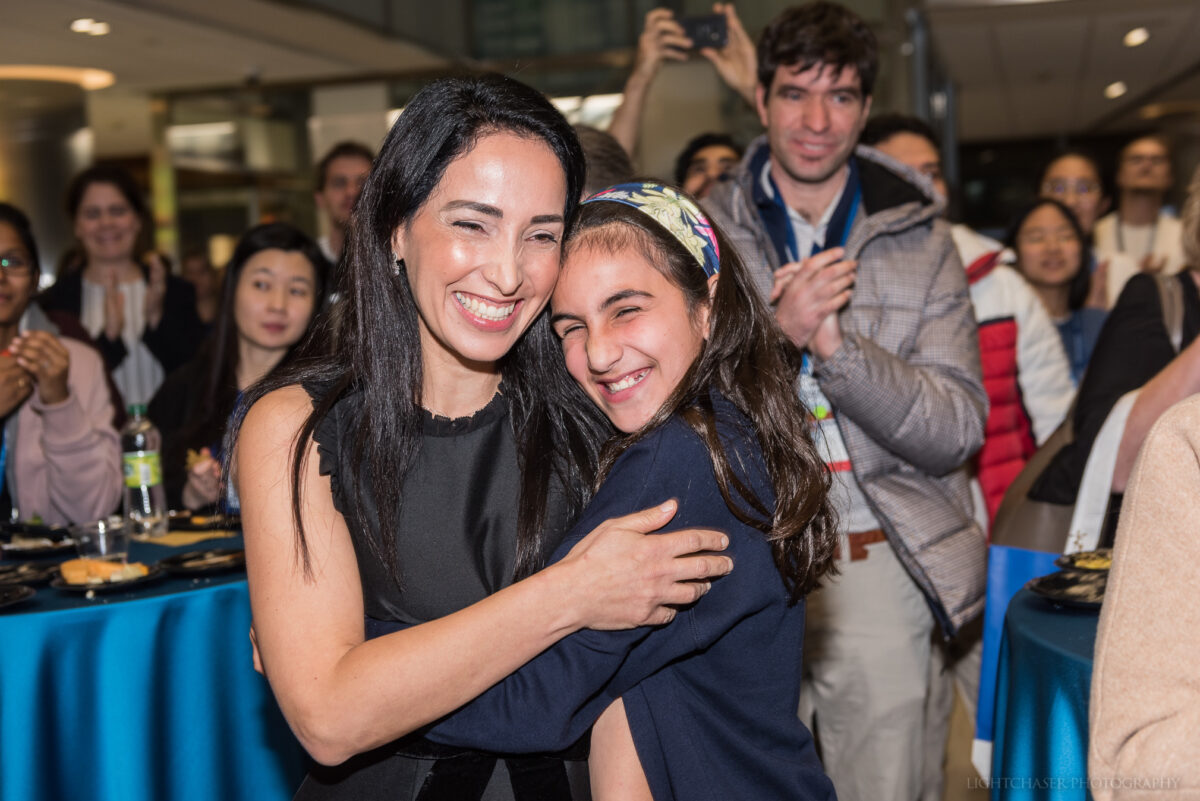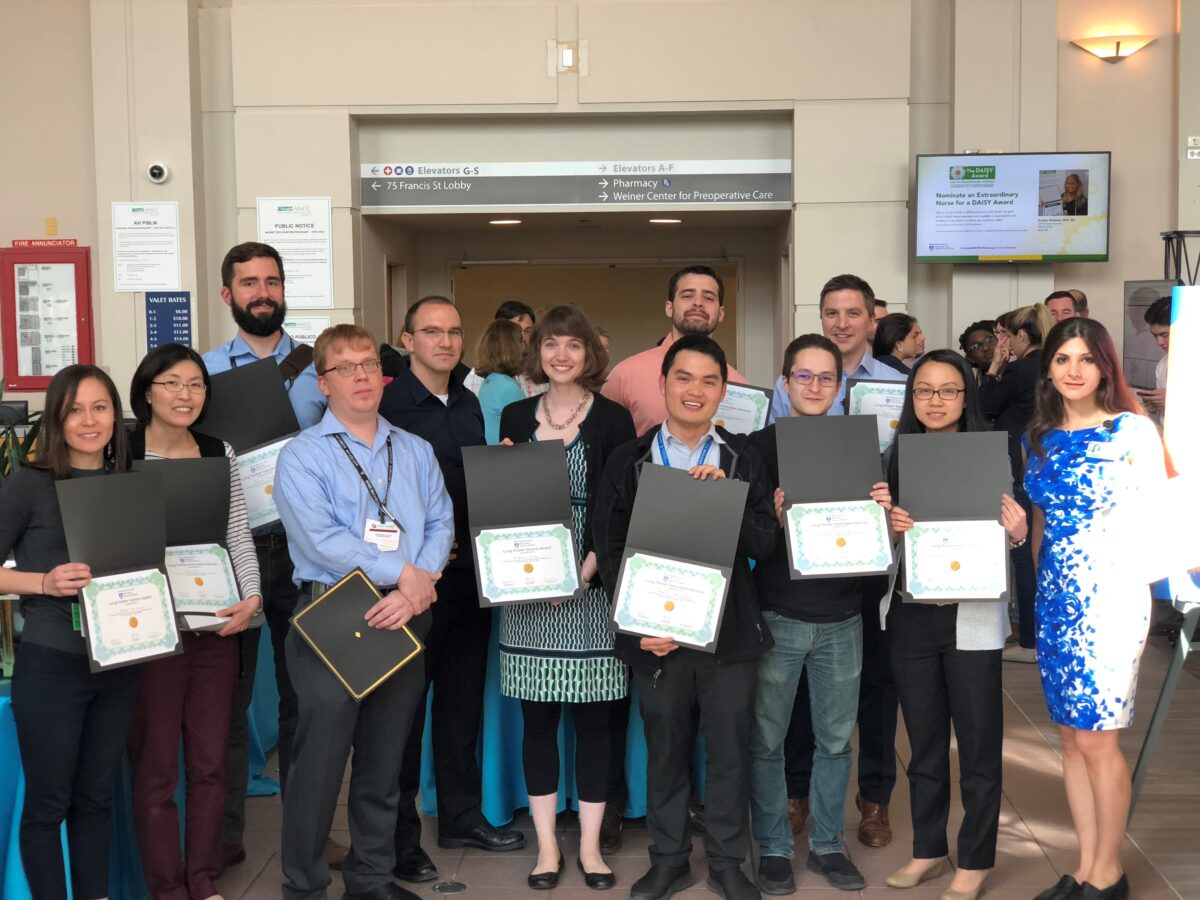Wednesday, May 9th, 2018, 1:30 – 4:30PM, Carrie Hall and Cabot Atrium
The Brigham Research Institute Lung Research Center hosted its annual research symposium and poster session that began in Carrie Hall with a keynote address by Jack Elias, MD, Dean of Medicine and Biological Sciences at Brown University. Dr. Elias prefaced his address to the standing-room only crowd by first remarking on the high turnout and impressive nature of the event. He noted that all institutions should be fostering the types of interactions that take place at events like this, which connect people with each other as well as the science.
While presenting his research on “Chitinase-like Proteins in Lung Injury, Repair and Disease,” Dr. Elias highlighted the importance of transitioning from work in “mouse to man and back again” to identify, validate and further interrogate the molecular underpinnings of diseases. This approach allowed his lab to make great strides in understanding how a ubiquitous class of proteins (chitinases in mice and chintinase-like proteins in humans) play a critical role in several diseases including asthma, fibrosis, lung cancer and several metabolic disorders. The exhaustive interrogation of the pathways in which these proteins act, eventually led to the development of antibodies with the potential for treating several of these diseases through immunotherapeutic approaches. At the end of his talk, Dr. Elias made a point to specifically address the younger attendees, encouraging them to always be curious and to take advantage of every opportunity and resource that they can, especially since they are part of this “great institution with great people.”
Following a brief Q&A, an interactive poster session was held in Cabot Atrium featuring 56 posters highlighting the extensive depth of lung biology research at BWH. From the minute the poster session began to the final moments before the awardees were announced, there was a tangible feeling of enthusiasm and an atmosphere of collaboration. As Dr. Elias mentioned in his talk, these poster sessions are a gateway to creating a unified approach to education and science.
During the session, a panel of judges evaluated the posters and selected twelve for recognition. Lung Research Center co-Chairs Raphael Bueno, MD, Bruce Levy, MD and Edwin Silverman MD, PhD presented six participants with honorable mentions, and awarded six $1,000 prizes to the poster winners. Antonio Arciniegas, MD, Patrick Burkett, MD/PhD, Moshe Lapidot, MD, Sergio Poli, MD, Phuwanat Sakornsakolpat, MD, and Jeong Yun received honorable mentions. The prize winners were N. Quynh Chu, MD, Daniel Dwyer, PhD, Kathleen Lee-Sarwar, MD, Nahal Masouri, MD, Benjamin Stump, MD/MPH, and Katherine Walker, MD/MSc.
A goal of the BRI, and a goal of these types of events, is to increase the visibility of Brigham research and showcase the hard work and dedication of our investigators. The symposium and poster session highlighted the exciting studies within the lung community, as well as encouraged cross-collaborative research efforts. At the conclusion of the symposium, the attendees were left with a greater sense of the lung research at BWH while those presenting posters felt truly appreciated by the larger BWH community.
Poster Winners
N.Quynh Chu, MD:3D-Printed Modeling of the Airway and Lung Lesions for Bronchoscopy Training
Daniel Dwyer, PhD: Single cell deconstruction of airway disease identifies allergic inflammatory memory in human respiratory epithelial progenitor cells
Kathleen Lee-Sarwar, MD: Early Life Intestinal Metabolites Are Associated with Childhood Asthma
Nahal Mansouri, MD: Mesenchymal Stromal Cell Exosomes Prevent and Revert Experimental Pulmonary Fibrosis Through Systemic Modulation of Monocyte Phenotypes
Benjamin Stump, MD, M: A High Throughput Drug Screen Identifies Glycogen Synthase Kinase (GSK)-3β Inhibition as a Key Regulator of Lymphangiogenesis.
Katherine Walker, MD, MSc: 15-epi-Lipoxin A4 resolves pathogen-initiated lung inflammation by inducing regulators of NF-κB
Honorable Mentions
Antonio Arciniegas, MD: Extrapulmonary Expression of Surfactant Protein D and Modulation of the Gut Microbiom
Patrick Burkett, MD, PhD: CLEC-2 regulates innate immune homeostasis in the lung
Moshe Lapidot, MD: Oncogenic features of KDM4A histone demethylase in mesothelioma
Sergio Poli, MD: sc-RNAseq of human lung explants depicts the lung cellular landscape and identifies different cell roles in idiopathic pulmonary fibrosis
Phuwanat Sakornsakolpat, MD: Genetic risk scores for COPD: identifying high risk individuals and understanding disease pathways
Jeong Yun: Single cell RNA sequencing analysis of Hhip+/- age associated emphysema model reveals cell type specific changes related to inflammatory pathways





